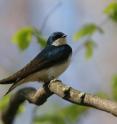Stress may lead to better bird parenting
Birds with high levels of stress hormones have the highest mating success and offer better parental care to their brood, according to new biology research at Queen's University. "Having high levels of glucocorticoid or stress hormone is often thought to indicate an individual in poor condition who has a low level of mating success. However, our research indicates that tree swallows with the highest levels of stress hormone have the highest reproductive success," says Frances Bonier (Biology) who investigates the way animals cope with challenges in their environment.
The researchers measured glucocorticoid levels in female tree swallows before and after experimentally changing their brood sizes. Females whose broods were enlarged by two nestlings nearly doubled their glucocorticoid levels, while the glucocorticoid levels of females whose broods were reduced remained unchanged.
Females with greater increases in glucocorticoids also fed their nestlings at higher rates, suggesting that stress hormones facilitate parental behaviour.
In previous years, the researchers found correlations between stress hormone levels, the number of offspring in a brood, and the amount of weight nestlings gained. The next stage is manipulating levels of stress hormones in tree swallows and observing subsequent effects on parental behaviour.
For all these studies, the focal system is a nest-box breeding population of tree swallows established more than 35 years ago at the Queen's University Biological Station (QUBS).
"The QUBS population of tree swallows offers a unique opportunity to conduct large-scale field experiments, allowing us to tease apart the complex interactions between the environment, physiology, behaviour, life history and fitness effects in free-ranging animals," says Dr. Bonier.
QUBS has been a pivotal part of research and teaching at Queen's for more than six decades and hosts researchers from both Canadian and international institutions. Research at QUBS has resulted in more than 800 publications in peer-reviewed journals and more than 200 graduate and undergraduate theses.
Dr. Bonier's research will be published in an upcoming issue of Biology Letters.
Source: Queen's University
Other sources
- Stress may lead to better bird parentingfrom Science DailyTue, 14 Jun 2011, 20:31:04 UTC
- Stress may lead to better bird parentingfrom PhysorgTue, 14 Jun 2011, 18:30:49 UTC
